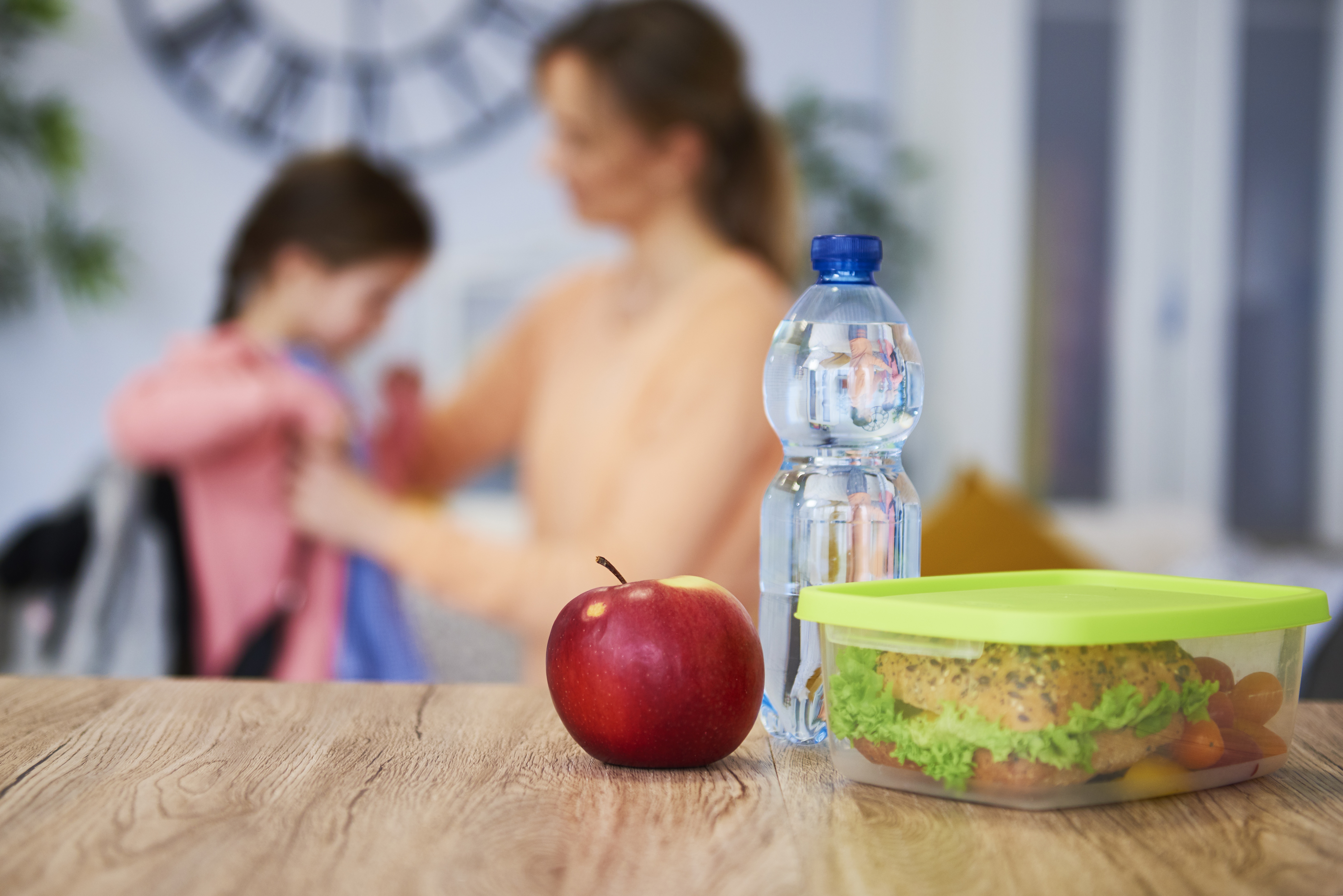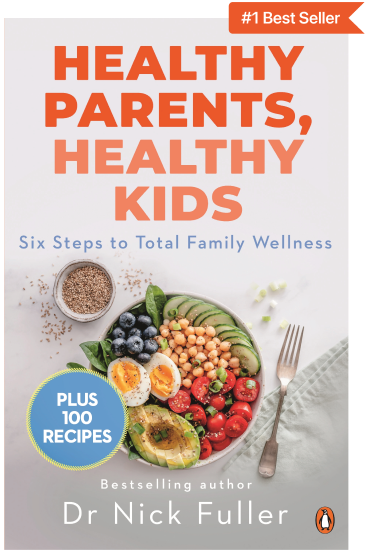Stress-Free Kids' Meal Prep Ideas to Make Everyday Life Easier

Dr Nick Fuller
Leading Obesity Expert at the University of Sydney and founder of Interval Weight Loss.

Feeding kids can sometimes feel like running a mini catering service. Between school mornings, after-school activities, and everything in between, finding time to plan, prep, and pack meals can get overwhelming. Here’s where meal prep can make a real difference.
Research shows that meals cooked at home, even partly, are more likely to include fruits, vegetables and wholegrains compared to pre-packaged options. Additionally, home-prepped meals consistently provide better nutrition than ready-made or takeaway choices.
This article will walk you through how advanced meal prep works, key things to consider before starting, and plenty of practical meal ideas for breakfast, lunch, snacks and dinner. Whether you’re looking to save time, reduce waste, or encourage fussy eaters to try something new, you’ll find kid-approved strategies here.
Dreading Weekly Meal Prep? Take the Guesswork Out of Planning.
Meal prep shouldn’t feel like a full-time job. In Healthy Parents, Healthy Kids, Dr Nick Fuller explores practical ways to make family meals easier and more manageable. From straightforward planning tips to ideas for keeping meals interesting, this guide helps take the stress out of weekday prep.
Make meal prep easier and more enjoyable for the whole family. Grab your copy of Healthy Parents, Healthy Kids today and simplify your weekly routine.
How Advanced Meal Preps Work
Meal prep isn’t only about cooking lots at once. It’s a way to make weekday meals easier to manage, healthier, and more fun for the kids. Here’s how it can help:
Saves time during the week
Spending an hour or two on the weekend can save hours across busy weekdays. A study found that adults who planned meals ahead were more likely to stick to dietary goals. For families, this translates to less rushing and more time enjoying meals together.
Reduces food waste
When you ‘meal prep’, you shop with a plan. This helps reduce the amount of unused food tossed out. In Australia alone, families waste about 2.5 million tonnes of food each year. Pre-portioning and freezing meals means fewer half-eaten bags of salad or forgotten leftovers in the fridge.
Encourages healthier choices
Children are more likely to eat nutritious foods when they’re prepped and ready to grab. Having fruit cups, veggie sticks and balanced meals on hand means your child is more likely to reach for these instead of processed snacks.
Makes picky eaters more open when they’re involved
Kids who help with meal prep are more willing to try the foods they’ve touched, chopped or stirred. According to a study, involving children in cooking increases their intake and curiosity about new foods. Even something as simple as letting them layer fruit in a parfait jar can make a difference.
Helps kids build routine and independence
Having set meals prepared teaches children structure and responsibility. When they know breakfast or lunch is ready to go, it builds independence while still giving parents peace of mind.
Key Things to Consider Before You Start
Before pulling out the chopping board, there are a few important things to keep in mind. These will help ensure your meal prep sessions are smooth and safe.
Kid-friendly portion sizes
Young children don’t eat the same as adults, so keep portion sizes realistic. Overfilling containers can lead to waste and overwhelm. Smaller portions also allow room for snacks and school treats.
Balance protein, veggies, carbs, and healthy fats
A balanced plate helps kids stay energised and focused. According to the Australian Dietary Guidelines, children need a mix of lean proteins, wholegrains, fruits, vegetables and dairy or alternatives daily. Prepping with balance in mind ensures you’re covering all the bases.
Allergy or school lunchbox rules
Check your child’s school guidelines before packing meals, especially around nuts, eggs or common allergens. Some schools have strict nut-free or allergy-aware policies to protect students with life-threatening allergies.
How long foods stay fresh in the fridge or freezer
Not all foods are created equal when it comes to storage. For example, hard-boiled eggs last up to a week in the fridge, but cut fruit usually only lasts 2–3 days. Freezer-friendly items like muffins, burritos and casseroles are perfect for longer-term storage.
Involve kids
Meal prep works best when kids feel included. Give them age-appropriate tasks, like washing veggies or choosing their yoghurt flavours. Involving them gives them ownership, making it more likely they’ll eat what’s prepared.
Breakfast Meal Prep Ideas
We’ve all heard that breakfast is the most important meal of the day, and research backs it up. But mornings are often the most hectic, so having breakfasts ready to go can be a game-changer. The key is to prep foods that store well in the fridge or freezer without losing flavour or texture.
- Make overnight oats in jars with fruit and yoghurt (fridge 3–4 days).
- Bake mini egg muffins with veggies and cheese (fridge or freezer).
- Cook waffles or pancakes in bulk and freeze for quick toaster breakfasts.
- Assemble smoothie packs in freezer bags, ready to blend.
- Wrap breakfast burritos with scrambled eggs, cheese and veggies, freeze, and reheat.
- Prep chia pudding cups with berries (fridge 3–4 days).
- Layer yoghurt parfait jars with fruit, keep granola separate (fridge 3 days).
- Slice and freeze banana bread or zucchini bread for grab-and-go.
- Hard-boil eggs in batches for easy protein snacks.
- Cut fruit into cups or skewers for ready sides.
Kickstart the day with fuss-free breakfasts kids will love. Check out Breakfast For Fussy Eaters: Recipes That Actually Work for quick, nutritious morning ideas.
Lunch Meal Prep Ideas
Once breakfast is sorted, lunch can often be the biggest challenge, especially with fussy eaters. Prepping a few options ahead of time saves time and keeps things interesting so kids don’t get bored of the same sandwich every day:
- Pack DIY lunchbox bentos with wraps, fruit, and snacks.
- Make pasta salad with hidden veggies, portion into containers.
- Cook mini quesadillas or roll-ups, refrigerate or freeze.
- Assemble turkey and cheese pinwheels with veggie sticks.
- Pre-portion hummus with pita and cucumbers in small cups.
- Batch-cook veggie fried rice and portion for reheating.
- Build homemade ‘lunchables’ with crackers, cheese, and protein.
- Spoon chicken or tuna salad into cups with crackers on the side.
- Bake pizza pinwheels ahead and freeze.
- Prep couscous or quinoa salad in lunch containers.
Snack Meal Prep Ideas
After lunch, keeping kids fuelled through the afternoon is key. Having snacks ready in advance prevents hangry meltdowns and reduces constant requests for packaged treats:
- Roll a batch of energy bites and store them in the fridge.
- Portion veggie sticks with dip into grab-and-go containers.
- Assemble fruit cups or skewers for 2–3 days.
- Bake mini muffins in bulk and freeze for lunchboxes.
- Mix nut-free trail mix and portion into bags.
- Cube cheese and pack with whole-grain crackers.
- Freeze yoghurt tubes to thaw by lunchtime.
- Roast chickpeas or edamame for a crunchy snack.
Snack time doesn’t have to be boring. Explore Innovative Salad Ideas for Kids That Make Veggies Fun for colourful, healthy munchies kids will actually eat.
Dinner Meal Prep Ideas
By the time evening rolls around, families are usually tired. Having dinner prepped ahead means you can heat, eat, and relax without the stress of cooking from scratch every night:
- Cook and freeze casseroles with hidden veggies.
- Pre-chop veggies and portion stir-fry kits.
- Bread chicken tenders or nuggets in bulk and freeze.
- Mix and freeze veggie-packed meatballs in meal-size bags.
- Assemble taco kits with prepped toppings in containers.
- Marinate chicken, beef, or tofu in freezer bags.
- Prep stuffed peppers with rice and protein, freeze for reheating.
- Make soup or chilli in bulk, freeze in single portions.
- Bake pasta dishes ahead, freeze in portions.
- Build grain bowls with roasted veggies and protein for the fridge.
Top Storage Tips for Quick, Healthy Meals
Good storage is the secret weapon of successful meal prep. With the right containers and a bit of organisation, you’ll save space, reduce waste and avoid the dreaded ‘mystery container’ at the back of the fridge.
- Use clear, stackable containers – saves space and lets you see what’s inside at a glance.
- Label meals with dates – keeps track of freshness and avoids mystery leftovers.
- Portion meals into single servings – makes reheating and packing lunchboxes quicker.
- Keep snacks in grab-and-go bins – gives kids easy access to healthy choices.
- Store freezer meals flat in bags – saves freezer space and helps meals thaw faster.
- Rotate older meals to the front – ensures nothing gets forgotten and wasted.
Final Thoughts
Meal prep for kids doesn’t need to be complicated; it’s all about creating a system that works for your family. Prepping breakfasts, lunches, snacks, and dinners ahead of time saves you stress during the week and makes it easier to offer nutritious, balanced meals. It also helps kids get into healthy routines and build a positive relationship with food.
So, grab your containers, get the kids involved, and start small. Even prepping just one meal type each week can make a big difference in your family’s daily rhythm.
Save time on weekly prep with meals kids will actually eat! Try these 7 Simple and Delicious Rice Dishes For Picky Eaters — perfect for batch cooking and busy weeknights.
Stay informed with fresh tips, expert guidance, unique deals, and tailored support!
Meet Dr Nick Fuller
My Story
As a father, I know first-hand that raising healthy and happy children is tricky. Children are fussy, particularly at the end of the day when they are shattered. We also live in a society where companies seek to profit from what we feed our kids; incorrect and damaging advice is pushed on us and marketed towards our children, and we have no time.
But with these recipes and resources, you and your children can enjoy simple and well-founded food and lifestyle choices for lifelong health.

About Dr Nick Fuller
Dr Nick Fuller is the founder of Interval Weight Loss and is a leading obesity expert at the University of Sydney with a Ph.D. in Obesity Treatment. Dr Fuller is also the author of three best-selling books and his work been published in top ranked journals in the medical field, including JAMA, Lancet and American Journal of Clinical Nutrition.
